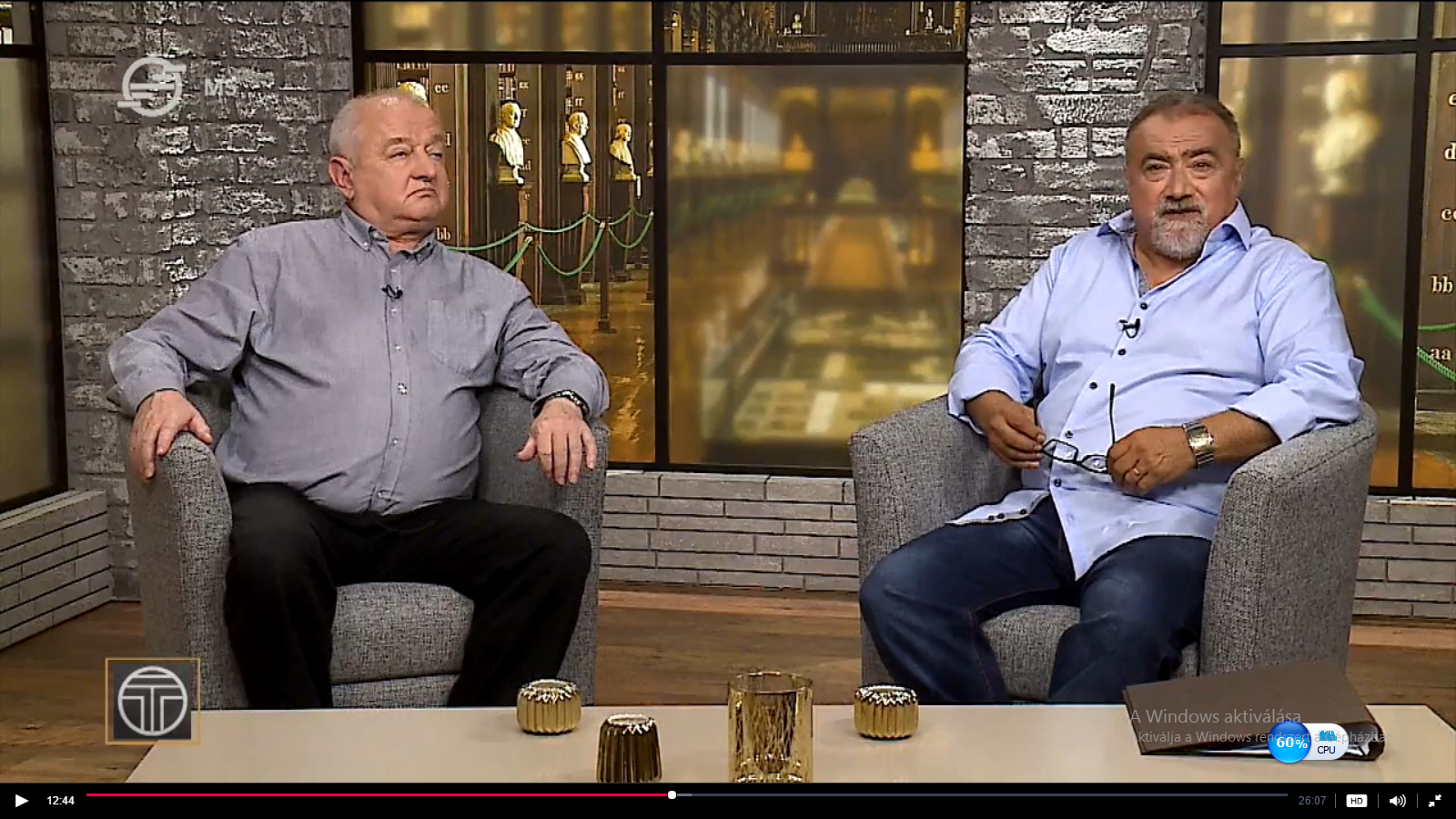HISTORY RELATED PROGRAMS IN HUNAGRIAN TV CHANNELS DURING A SELECTED WEEK 9-15 April, 2018
Third update
Updates
2012 (tv) | 2014 (web) | 2016 (web) | 2016 (tv) | 2017 | 2018
THE PROGRAMME OF THE PUBLIC CHANNELS:
Duna Channel
History-related programmes of the week
There were no new/current historical documentaries or programmes scheduled for this week which would deal directly historical topics. However, there were reruns of episodes of history-related television programmes:
Rerun of the historical educational documentary series A rejtélyes XX. század / ’Mysterious 20th Century’, which was mentioned an analysed in our previous reports.
Rerun of the historical educational documentary series Hagyaték / ‘Legacy’ (documentary programme on Hungarian cultural history and cultural heritage). As the subtitle of the series ’Terrestrial guardians of the celestial crown’ shows, the series aims at presenting the guardians of the legacy of Hungarian national history.
The other (very loosely) history-related programmes were mainly studio conversations between a reporter and an artist or sportswoman/sportsmen abour her/his carreer.
All of these programmes were aired usually during night.
M3
History-related programmes of the week
Időmetszetek / ‘Time-segments’ (montage-based short compilation documentary programme based on the archives of Hungarian Television and Hungarian News Agency). The programme is nothing more than a slideshow of archive still photographs, organized thematically (i.e. ‘agriculture from the 1950s’, ‘fashion of the 1960s’). These compilation films were aired usually during night.
M5
History-related programmes of the week
A two part series historical documentary: Az élet ára – A Weiss Manfréd-család története / ‘A life’s price – The story of the Weiss Manfréd family’ (the story and carreer of the Jewish entrepreneur and his family).
Mindenki Akadémiája / ‘Everybody’s Academy’: this is an educational programme which eventually focuses on historical topics. This week one show was dedicated to the battles of the Ottoman–Hungarian Wars (XVth century).
Rerun of the series Történelem és irodalom mindenkinek: Tőkéczki és Takaró / ‘History and literature for eveybody: Tőkéczi and Takaró’ (Talks and discussions in a studio. It is organized around two well-known public intellectuals, László Tőkéczki and Mihály Takaró.) This week’s shows discussed the life of Baron Miklós Wesselényi, famous Hungarian statesman, one of the leaders of the so called Reform Age (early and mid-XIXth century), and the life of Miklós Bethlen, a Hungarian politician and writer from the XVIIth century.
THE PROGRAMME OF THE COMMERCIAL CHANNELS:
RTL Klub:
History-related programmes of the week
There were no programmes which were connected to history this week.
TV2:
History-related programmes of the week
There were no programmes which were connected to history this week.
THE REPRESENTATION OF HISTORY IN HUNAGRIAN TV CHANNELS’ NEWS PROGRAMMES DURING A SELECTED WEEK
9-15 April, 2018
The news shows of the three national channels in Hungary, similar to the contemporary Hungarian political landscape show a radical polarization according to political affiliations. M1 is the official non-commercial station of the Hungarian Television, and this channel has in the last eight years been transformed into an uncritical outlet of the current government. TV2 is owned by businessmen loyal to the current government. Thus, these two stations function according to the perceived political benefits of Orbán’s party, Fidesz. While M1 attempts to create the impression of a more or less informative news station, TV2 runs unabashed tabloid-style news only. On the other hand, RTL Klub in the last few years broadcasts anti-government oriented news shows, mainly because the channel resisted take-over attempts by the businessmen close to the current government. The station has been hit by special taxes by the legislation. This framework explains why each time history is mentioned in these stations, these news items serve contemporary political goals.
The week in question follows the national elections held on April 8, 2018. The news programs of the entire week are dominated by the various political sides’ narratives about the elections.
April 9 news shows of the national channels:
M1
– brief mentioning of the 50th anniversary of Martin Luther King’s assassination
RTL Klub
– no historical topic
TV2
– No historical topic
April 10 news shows of the national channels:
M1
– no historical topic
RTL Klub
– brief historical report about the now-terminated daily newspaper ‘Magyar Nemzet.’ The report details the role of the paper throughout WWII and the state socialist decades.
TV2
– no historical topic
April 11 news shows of the national channels:
M1
– no historical topic
RTL Klub
– no historical topic
TV2
– no historical topic
April 12 news shows of the national channels:
M1
– the news program includes a report about the Holocaust Remembrance Day, accounts the commemorative events in various countries. The Israeli ambassador to Budapest says that we cannot change history: however, we need to remember it. The descendants of individuals who saved Jewish lives were awarded during the Budapest commemorative ceremony.
– the news program includes a report (with archival footage) about the 70th anniversary of the deportation of Hungarians from the Felvidék (an area in south Slovakia that formerly belonged to Hungary and is inhabited by many ethnic Hungarians). After WWII, Hungarians in Czechoslovakia were collective labelled Nazi collaborators and deported to Hungary.
RTL Klub
– no historical topic
TV2
– no historical topic
April 13 news shows of the national channels:
M1
– no historical topic
RTL Klub
– no historical topic
TV2
– no historical topic
April 14 news shows of the national channels:
M1
– no historical topic
RTL Klub
– no historical topic
M2
– no historical topic
April 15 news shows of the national channels:
M1
– A report outlines the programmes of the Memorial Day for the Hungarian Victims of the Holocaust, to be held on April 16 (ghettoization in Hungary started on this day in 1944). The official programmes however started a day earlier, and commemorated the priest László Ádám, who saved many Jewish lives. The artist whose photos are exhibited stresses in an interview that the Holocaust is part of our history which we have to remember.
RTL Klub
– no historical topic
TV2
– brief report about the Memorial Day for the Hungarian Victims of the Holocaust, and the commemorative events at the Terror Háza Museum.
REACTIONS AND CONNECTIONS OF WEB CONTENT TO HISTORY RELATED MATERIALS ON HUNGARIAN TV CHANNELS – ANALISYS OF A SELECTED WEEK
9-15 April, 2018
First of all, we have to repeat what we wrote at the beginning of last year’s web report: the report on TV programmes testify that history related content has basically disappeared from Hungarian television. History related programmes are extremely rare, and most of them are repetitions of old educational programmes, or series that do not have any potential to provoke any fresh reactions from the audience. Because of this, it is impossible to find any meaningful connection between this non-existent historical material and activities on the internet.
But we have found one piece of interesting material on the internet that is related to history, and appeared on the 9th of April, that is the first day following the Hungarian general parliamentary elections of 8th April. This piece of writing was published on the website of Magyar Idők [Hungarian Times – conservative daily newspaper, directly controlled propaganda media outlet of the government and Orban’s Fidesz party).
The title of the article is the following: Történelmünk rehabilitációja elkerülhetetlen (The rehabilitation of our history is inevitable)[1]
The time of the article’s publishing, and the topic of the article are also symbolic. Right after the new victory of the Fidesz party their propaganda outlet publishes an article that suggest that it is time to rethink the basics of Hungarian national history. The author (a librarian) suggest that the research about the origin of the Hungarian language has to be revised, and the view that the Hungarian language is part of the Ugric group of the Uralic languages has to be revised. This is a returning topic of the nationalist discourse since the racial connection that this linguistic origin suggest connects the Hungarian people to Mongol races such as the Uralic people (Mansi, Khanty). The nationalist tradition prefers the idea of the Scythian-Hun origin and ancestry, and try to prove its argument by DNA results.
What is significant here, and in many of the similar nationalist discourses like this, is the attitude that is based on the view that the results of scientific research and argumentation can and should be modified according to the feelings and inclinations of “the nation” – if we “feel” Scythian-Hun then we should revise science accordingly.
The article (and its timing) is another fine example of the mechanisms of the political regime: when one rules, one rules over science and history. Who has the political power can and should dictate how history is understood and what parts of history is important.
On the webpage where the article was published there is no comment section. But Magyar Idők has a Facebook page where it is possible to comment on their material. It could not be said that this article stirred any substantial discussion (there is only 12 posts under the article in FB at this moment) – partially this might be the result of the fact that these kind of propaganda sources are mainly followed by those who are already the believers of their message. At the same time, it is also true that 5 out of the 12 posts are actually criticising the article on the grounds of logical thinking, and scientific research – and that is not a bad proportion. (The post has also been shared 47 times.)
[1] https://magyaridok.hu/velemeny/tortenelmunk-rehabilitacioja-elkerulhetetlen-2875731/

